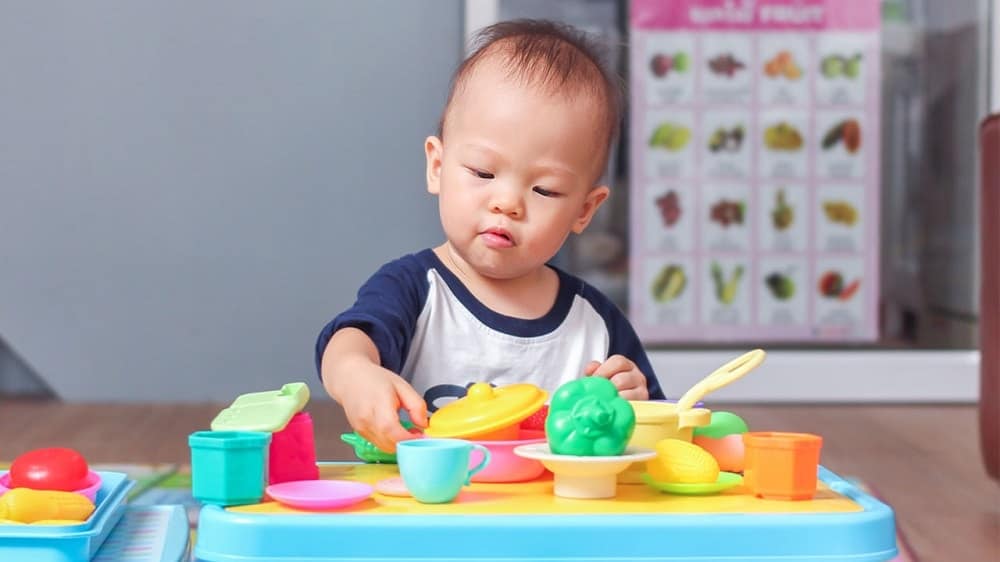
Table of Contents
Firstly, congratulations! A whole year has passed since your pregnancy and you’re all set to celebrate your little munchkins’ graduations from a baby to a toddler. Isn’t this exciting? We’re sure you’re wondering, ‘Where did the year go?’
But, try not to get carried away with the baby’s first birthday as there is still time for you to wait as the little one is still just a baby. While the past year was rather filled with excitement and multiple firsts, there is still time for you to account for the developmental milestones! So, take a seat, grab your drink, and read on to know everything you need to know about your 12-month-old baby and more with the help of this article curated by Parenthood Bliss!
Your 12-Month-Old Baby Milestones, Sleep Patterns, And Growth As Per The American Academy Of Pediatrics
According to The Centers for Disease Control and Prevention (CDC) your baby’s
1. Sleeping hours and patterns
Expect the 12-month-old babies to sleep for about 11 hours at night with up to two daily naps adding to 3-4 hours in a 24-hour cycle. In case your baby experiences sleep regression due to the changes in their body, make sure to consult your doctor for the same.
2. Feeding requirements
At 48 weeks your baby can consume up to 24 ounces of breast milk or formula or cow milk in a 24-hour cycle along with solids. However, a parent must make sure to start weaning the baby from bottle-feed to a sippy cup, unless their doctor says otherwise.
3. Your 12-month-old baby's weight
The average weight of a 12-month-old baby girl is 19.12 pounds and 21.04 for baby boys. If you observe the weight to be more or less, make sure to consult your doctor.
4. Your baby's bowel movements
Your baby at 12-months is expected to be on their twos while most babies prefer to be on their fours, still, either way, it is expected that parents have already baby-proofed their house to prevent any unforeseen hazard with stair gates and doorway gates too. To further enhance your little one’s ability and development skills, give them musical toys, puzzles, crayon books, etc.
What to Expect From Your 12-Month-Old Baby's Health?
With their first birthday celebration, make sure you also get ready for the child’s second round of vaccinations. With their growing physical abilities, independence, and mobility, they are capable of a lot more things now, so, here is what you can expect from your baby’s health at this age:
1. The Daily Doctor's visit
This month, expect your pediatrician to do a full physical examination and a quick finger prick test to check for anemia. This visit is also the best time for you to consult your doctor regarding the weaning process of your baby to ease the process.
2. MMR Vaccine
This vaccine helps to protect your child against the development of the three contagious illnesses:(1) measles, (2) mumps, and rubella or German measles. The first dose is given between 12 and 15 months and the second when between 4 and 6 years old.
3. Hepatitis A vaccine
A 1-year-old baby must get their first dose when they are around 12 to 23 months old. This is a vaccination that protects the little one against a contagious liver infection that could lead to liver failure. While the second dose must be given at least 6 months later.
4. Varicella vaccine
This protects the babies from getting one of the most common diseases in childhood, chickenpox. In the present times, a child is given their first dose starting at 12 to 15 months and the second between 4 and 6 years of age.
Taking Care Of Your 12-Month-Old Baby: Quick Tips And Tricks
While the baby is graduating from a baby to a toddler, there are a lot of things that the parents would have to keep in mind while the baby
- Changes their play pattern
- Develop language and words
- Start grabbing onto small objects
- Talk now often
- Acquire different food taste
- Build on their motor skills
- Had started crawling
All these are their first milestone from being a newborn. There is a lot more to come, and here’s how you can ace it with ease:
1. Playing With Food
At 12 months, your baby is expected to play with their food more and one can hardly do anything to do away with the mess by indulging in it and trying to cooperate to feed them healthy food. However, try and:
- Set them onto a high chair when they are getting ready to eat and prevent them from experimenting with the food
- Offer just a limited amount of finger foods during mealtime to keep the portions to a pint-size, avoiding food experiments and more eating during mealtime. The reason is, in more cases, too many choices and a big portion could overwhelm the little eater
- Avoid yelling at them when they choose to play with food, but try and limit the scope of the mealtime mayhem
- Do not pressurize your baby to eat more and more. We understand that as a parent you’d only want the baby to have a good portion, but forcing them into a huge portion isn’t the way to go about it. Instead, teach them about the second serving of antics
- Try and set your eating time with your baby so they can imitate you while you eat with them
2. Safety From The Tub
At 12 months, it is expected for a baby to play with water and with their water table in the backyard. However, it could be rather stressful for the parents as they are just discovering their skill sets and mobility. So try and:
- Distract your baby when they wish to be extremely experimental and stubbornly squirmy. Sing a special bathtime tub song, blow bubbles in a bubble bathtub and let them pop, let them play with the bath toys, float and sink ships, fill and empty cups, etc.
- Try and work fast unless the little munchkin is grimy. If they are, try a few quick swipes using a washcloth to minimize the wriggle.
3. Encourage Walking (If Not Already)
Here’s how you can encourage your baby to walk if they aren’t already or prefer to be on their fours:
- Allow them to have space and time to start walking and give them every opportunity to stand on twos.
- Using a push-toy is the best way for the baby’s fine-tune locomotion and helps build their skills, polish their mobility, and encourage them to walk while they drag the toy along with them. For instance, a pint-sized stroller.
Postpartum Changes And Pro Tips
Here are a few tips to help you in the parenting process:
1. Purchasing Stuffed Toys
Here are a few guiding options that will help you buy the best-stuffed toy for your 48-week-old child
- Add ons – Avoid toys that are made of buttons, beads or small objects as they could or chew off easily. In easy words, prevent buying a toy that has items that are glued or sewn as they have a good chance of ending up in a baby’s mouth, causing a choking hazard
- Wire-free – Parents must avoid buying toys that have wire in them, even if under a soft fur. This is because it could poke through and injure your little one
- Avoid any stringy – A stringy could include ribbons or leashes
2. Soothing Sore Arms
Do your arms hurt from picking up the baby? As per records, most moms observe pain in the inner part of their wrists that gets worse from picking up their baby.
- Also known as DeQuervain’s tenosynovitis for an inflamed thumb tendon. It is caused due to the excessive use of the wrist, contributing to inflammation
- Try and rest your wrists more often and keep the wrists, avoiding them to be dipped down
- A doctor may also fit a wrist splint, and/or recommend a cortisone injection, last-ditch relief, and surgery.
- Try and work out with weights to help strengthen the arms and shoulders, use armrests, use a nursing pillow, frequently switch arms while carrying the baby, use a baby carrier, or sling to help transfer the baby’s weight, and use a heating pad to ease the muscles.
To Conclude
A 12-month-old baby’s fine and motor skills development is a notch higher as they switch from a baby to a toddler, and learn to be independent children, acquire different sounds, develop their brain, etc.
So, parents must make sure to start and build upon their bonding with the baby and understand that they will now grow to become independent humans. Make sure to support them in their journey, help them get things they would need, take them to play-date to build their social skills, etc.
FAQs on 12-month-old baby
1) What should a 48-week-old be doing developmentally?
2) What can I expect my 1-year-old baby to say?
3) When should you worry if your child is not talking?
Sources
Reviewed By:

Nimrat Sidhu - Pediatration
Dr. Nimrat S Sidhu is a practicing pediatrician for about 5 years now and holds an MD pediatrics degree. She was the topper of her batch, has always had a keen interest in her core medical field, and is specially trained for neonatal resuscitation.
She has published multiple research papers on pediatrics and is interested in topics like Neonatal care, skincare, baby growth, vaccination, growth, and development.





